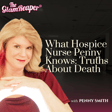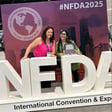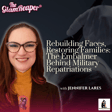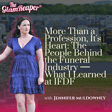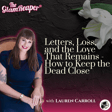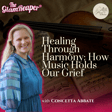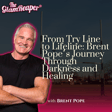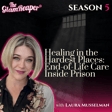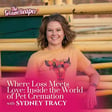
Tiny Coffins, Big Emotions: The Hidden Side of Childhood Grief
What if we stopped judging grief and started honoring it instead?
In this powerful episode of The Glam Reaper Podcast, we sit down with Michaelene Dowers, a licensed funeral director, thanatologist, and founder of Pollen Care—a one-of-a-kind resource for children facing grief, from the loss of a parent to the pain of divorce or even the death of a pet. We open up about the hard conversations many avoid—how children process loss, why every type of grief matters, and the emotional cost of showing up for others in dark moments.
We also explore why some families avoid holding services, how judgment sneaks into our grief culture, and the deeply personal ways loss can show up. From a missing stuffed goat to a life lost too soon. Michaellean shares how she curates books and tools to help kids and parents cope when words fall short, and why no loss, no matter how “small”—should ever be dismissed.
Tune in to feel seen, understood, and reminded that no one’s grief should be compared, measured, or ignored. Whether you're a parent, a professional, or someone who's simply loved and lost—this one will stay with you.
Key Topics:
-Children deserve honest tools to process grief
-No loss is too small to be acknowledged
-Judgment has no place in someone’s mourning
-Grief after tragedy needs care for all involved
-Healing begins with presence, not pressure
Quotes from the episode:
“The grief is as real for a child as it is for an adult—it just looks different.”
-Michaelene Dowers
“I don’t understand this hierarchy of grief—why does it matter whose pain is worse?”
-Jennifer Muldowney
Timestamp:
[00:00] Podcast Intro
[00:20] Michaelene Dowers, a funeral director and thanatologist, shares how she helps grieving families by carefully choosing books and resources for children based on their age, background, and the kind of loss they’re facing.
[09:40] Michaelene and Jennifer talk about how grief often shows up in quiet, unexpected ways. They reflect on how parents make tough choices during painful times and how even small moments, like missing a funeral or losing a pet, can leave lasting marks on a child’s heart.
[16:09] The conversation opens up to the deeper truth that every kind of grief matters. Whether someone is grieving a person, a relationship, or even a cherished item, what they feel is real.
[22:40] As they wrap up, they speak honestly about the emotional weight carried by those who work with grief every day. From tragic events like school shootings to heartbreaking family situations, Michaelene continues to offer comfort and hope through her work with Pollen Care, making sure no family feels alone.
[28:09] Outro
Connect with Michaelene Dowers:
LinkedIn:linkedin.com/in/mdowers
Websites - Pollen.Care (Company)
Quietusbee.com (Company)
Connect with Jennifer/The Glam Reaper on socials at:
Instagram - https://www.instagram.com/jennifermuldowney/
TikTok - https://www.tiktok.com/@therealglamreaper
YouTube - https://www.youtube.com/@TheGlamReaperMuldowney
LinkedIn - https://www.linkedin.com/in/jennifermuldowney/
Facebook Page - https://www.facebook.com/MuldowneyMemorials/
Email us - glamreaperpodcast@gmail.com
Shop Merch - https://the-glam-reaper.printify.me/products
Listen to The Glam Reaper Podcast on Apple Podcasts:
https://podcasts.apple.com/us/podcast/the-glam-reaper-podcast/id1572382989?i=1000525524145
The Glam Reaper® AMAZON Storefront - https://amzn.to/4hObpOh

